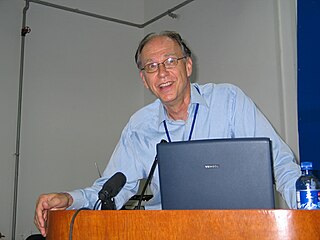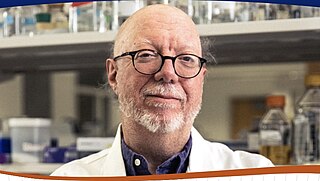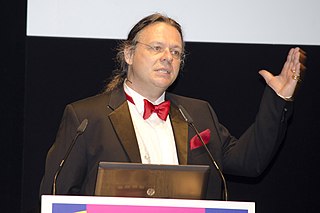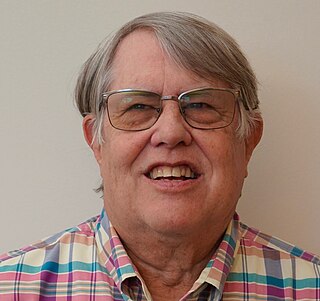Terrence Joseph Sejnowski is the Francis Crick Professor at the Salk Institute for Biological Studies where he directs the Computational Neurobiology Laboratory and is the director of the Crick-Jacobs center for theoretical and computational biology. He has performed pioneering research in neural networks and computational neuroscience.
Jeffrey David Ullman is an American computer scientist and the Stanford W. Ascherman Professor of Engineering, Emeritus, at Stanford University. His textbooks on compilers, theory of computation, data structures, and databases are regarded as standards in their fields. He and his long-time collaborator Alfred Aho are the recipients of the 2020 Turing Award, generally recognized as the highest distinction in computer science.
Warren John Ewens is an Australian-born mathematician who has been Professor of Biology at the University of Pennsylvania since 1997. He concentrates his research on the mathematical, statistical and theoretical aspects of population genetics. Ewens has worked in mathematical population genetics, computational biology, and evolutionary population genetics. He introduced Ewens's sampling formula.
Eric Rodger Pianka was an American herpetologist and evolutionary ecologist.

Noah Aubrey Rosenberg is a geneticist working in evolutionary biology, mathematical phylogenetics, and population genetics, and is the Stanford Professor of Population Genetics and Society. His research focuses on mathematical modeling and statistical methods for genetics and evolution and he is the editor-in-chief of Theoretical Population Biology.

Michael Spencer Waterman is a Professor of Biology, Mathematics and Computer Science at the University of Southern California (USC), where he holds an Endowed Associates Chair in Biological Sciences, Mathematics and Computer Science. He previously held positions at Los Alamos National Laboratory and Idaho State University.
John Tinsley Oden was an American engineer. He was the Associate Vice President for Research, the Cockrell Family Regents' Chair in Engineering #2, the Peter O'Donnell, Jr. Centennial Chair in Computing Systems, a Professor of Aerospace Engineering and Engineering Mechanics, a Professor of Mathematics, and a Professor of Computer Science at The University of Texas at Austin. Oden has been listed as an ISI Highly Cited Author in Engineering by the ISI Web of Knowledge, Thomson Scientific Company.
Dr. Charles A. Ofria is a Professor in the Department of Computer Science and Engineering at Michigan State University, the director of the Digital Evolution (DEvo) Lab there, and Director of the BEACON Center for the Study of Evolution in Action. He is the son of the late Charles Ofria, who developed the first fully integrated shop management program for the automotive repair industry. Ofria attended Stuyvesant High School and graduated from Ward Melville High School in 1991. He obtained a B.S. in Computer Science, Pure Mathematics, and Applied Mathematics from Stony Brook University in 1994, and a Ph.D. in Computation and Neural Systems from the California Institute of Technology in 1999. Ofria's research focuses on the interplay between computer science and Darwinian evolution.

Lakshminarayanan Mahadevan is an Indian-American scientist. He is currently the Lola England de Valpine Professor of Applied Mathematics, Organismic and Evolutionary Biology and Physics at Harvard University. His work centers around understanding the organization of matter in space and time. Mahadevan is a 2009 MacArthur Fellow.

Bruce Randall Donald is an American computer scientist and computational biologist. He is the James B. Duke Professor of Computer Science and Biochemistry at Duke University. He has made numerous contributions to several fields in Computer Science such as robotics, Microelectromechanical Systems (MEMS), Geometric & physical algorithms and computational geometry, as well as in areas of Structural Molecular Biology & Biochemistry such as Protein design, Protein Structure Determination and Computational Chemistry.
Jianqing Fan is a statistician, financial econometrician, and data scientist. He is currently the Frederick L. Moore '18 Professor of Finance, Professor of Operations Research and Financial Engineering, Professor of Statistics and Machine Learning, and a former Chairman of Department of Operations Research and Financial Engineering (2012–2015) and a former director of Committee of Statistical Studies (2005–2017) at Princeton University, where he directs both statistics lab and financial econometrics lab since 2008.

Tandy Warnow is an American computer scientist and Grainger Distinguished Chair in Engineering at the University of Illinois at Urbana–Champaign. She is known for her work on the reconstruction of evolutionary trees, both in biology and in historical linguistics, and also for multiple sequence alignment methods.

Burkhard Rost is a scientist leading the Department for Computational Biology & Bioinformatics at the Faculty of Informatics of the Technical University of Munich (TUM). Rost chairs the Study Section Bioinformatics Munich involving the TUM and the Ludwig Maximilian University of Munich (LMU) in Munich. From 2007-2014 Rost was President of the International Society for Computational Biology (ISCB).

James R. Chelikowsky is a professor of physics, chemical engineering, and chemistry at The University of Texas at Austin. He is the director of the Institute for Computational Engineering and Sciences' Center for Computational Materials. He holds the W.A. "Tex" Moncrief Jr. Chair of Computational Materials.
Marcus William Feldman is the Burnet C. and Mildred Finley Wohlford Professor of Biological Sciences, director of the Morrison Institute for Population and Resource Studies, and co-director of the Center for Computational, Evolutionary and Human Genomics (CEHG) at Stanford University. He is an Australian-born mathematician turned American theoretical biologist, best known for his mathematical evolutionary theory and computational studies in evolutionary biology, and for originating with L. L. Cavalli-Sforza the theory of cultural evolution.
Michael Justin Kearns is an American computer scientist, professor and National Center Chair at the University of Pennsylvania, the founding director of Penn's Singh Program in Networked & Social Systems Engineering (NETS), the founding director of Warren Center for Network and Data Sciences, and also holds secondary appointments in Penn's Wharton School and department of Economics. He is a leading researcher in computational learning theory and algorithmic game theory, and interested in machine learning, artificial intelligence, computational finance, algorithmic trading, computational social science and social networks. He previously led the Advisory and Research function in Morgan Stanley's Artificial Intelligence Center of Excellence team, and is currently an Amazon Scholar within Amazon Web Services.
Luay K. Nakhleh (Arabic): لؤي نخله; born May 8, 1974) is a Palestinian-Israeli-American computer scientist and computational biologist who is the William and Stephanie Sick Dean of the George R. Brown School of Engineering, a professor of Computer Science and a professor of BioSciences at Rice University in Houston, Texas.
Daniel Mier Gusfield is an American computer scientist, Distinguished Professor of Computer Science at the University of California, Davis. Gusfield is known for his research in combinatorial optimization and computational biology.
Keith A. Crandall is an American computational biologist, bioinformaticist, and population geneticist at George Washington University, where he is the founding director of the Computational Biology Institute, and professor in the Department of Biostatistics and Bioinformatics.

Ila Fiete is an Indian–American physicist and computational neuroscientist as well as a Professor in the Department of Brain and Cognitive Sciences within the McGovern Institute for Brain Research at the Massachusetts Institute of Technology. Fiete builds theoretical models and analyses neural data and to uncover how neural circuits perform computations and how the brain represents and manipulates information involved in memory and reasoning.








